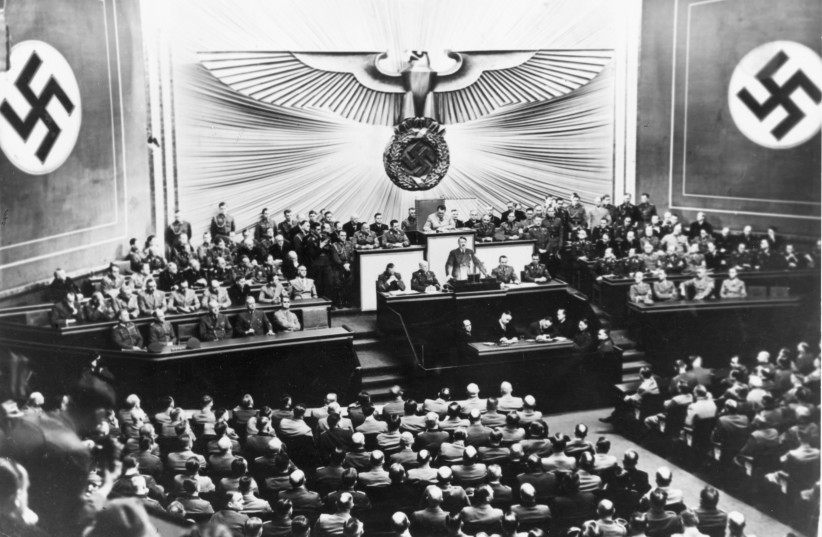A common criticism of Israel’s military campaign in Gaza is that Hamas is an idea, and because an idea cannot be defeated, it is futile to fight Hamas. Writing for The New York Times in 2010, Amos Oz, the celebrated Israeli author, made this point forcefully. He wrote: “Hamas is an idea... No idea has ever been defeated by force – not by siege, not by bombardment, not by being flattened with tank treads, and not by marine commandos. To defeat an idea, you have to offer a better idea, a more attractive and acceptable one.”
A somewhat different opinion was voiced by Bret Stephens, a New York Times analyst who noted, “You may not be able to kill an idea but you can defang it, just as you can persuade future generations that some ideas have terrible consequences for those who espouse them.”
The question, however, is how one can persuade people that “some ideas have terrible consequences,” and how an alternative idea can be made to appear better, more attractive, or more acceptable than Hamas’s conviction that Israel must be obliterated by force. To address this issue, we turn now to the psychology of ideas to explain when and how they are embraced or abandoned.
Human beliefs are motivated not only by our (explicit) desire for the truth but also by hidden, ulterior motives, producing “wishful thinking.” Ideas are functional; they serve as means to the satisfaction of basic human needs. An idea is accepted if seen to serve an important need and is abandoned when it doesn’t.
Persuasion isn’t about logic or information. It’s about motivation. An entrenched ideology seen to best serve a need is recalcitrant to “logical” attempts to undo it unless refuted by overwhelming evidence, inimical to that need. A decisive military victory over a group makes its ideology less compelling and motivates its supporters to consider alternative beliefs.

It might seem that Hamas will never be dissuaded from its fanatical credo. By implication, therefore, the only way to prevail upon it is through its total annihilation – to the last of its warriors. One must distinguish here, however, between the leadership of Hamas, the several thousand hard-core combatants committed to its ideology, and the millions of Hamas’ followers – the inhabitants of Gaza – who are much less adamant about it.
Hamas’s extremism, as with any ideology, is not an end in itself. It is a means to satisfying the basic human need of feeling worthy, proud, and significant, through serving the values and imperatives that the ideology represents. Those who embrace that narrative gain significance by fighting, risking life and limb, and making sacrifices for that cause.
Separating Hamas from its followers
Still, whereas the human need for significance is universal and immutable, the ideological means that serve it are malleable and substitutable. Hamas’s military defeat may set the conditions for Gazans’ consideration of alternative means to significance, perhaps through nationhood in the framework of a two-state solution, instead of through the fanatic ideology of destroying Israel.
The diehards in Hamas’s leadership and its hardened combatants will remain committed to its ideology, come what may. But many Gazans, perhaps a majority, may come to doubt the realism of its vision and the wisdom of its ways. With their significance in shambles, they might look for alternative means to restore it.
Countless historical examples support this analysis, perhaps none more compelling than that of Germany during the Third Reich (1933-1945) and in the immediate aftermath of World War II. Initially, most Germans supported Hitler and the Nazis in Germany’s conquest of Europe. They were proud of Hitler’s quick victories and rejoiced in them.
As historian Richard J. Evans notes, Hitler’s early victories (1939-1941) were met with resounding enthusiasm by his countrymen. After all, the Nazi way appeared to deliver on its promise to make Germans feel “great again,” erasing the humiliation they suffered in the 1919 Treaty of Versailles. Yet, after their nation’s defeat in 1945, the Germans abandoned National Socialism and embraced the alternative road to significance offered by liberal democracy.

In 2014, at the peak of the Islamic State (ISIS) successes, every month 2,000 recruits were crossing the Turkey-Syria border to join. After it lost its edge in 2016, this current was reduced to a trickle of some 50 volunteers a month.
The need for rehabilitation
It is not enough to defeat Hamas militarily, however. An additional, equally important ingredient must be put in place – a plan to rehabilitate Gaza: Rebuild homes, public buildings, and infrastructure, restore roads, electricity, and water systems, revitalize Gaza’s economy, and set conditions for Gazans’ well-being significantly above the deplorable levels prevailing during the Hamas rule.
The Marshall Plan, an American initiative after the end of WWII created the “miracle” of Western Europe’s economic recovery, in particular that of defeated Germany. A similar plan for Gaza may go a long way toward estranging Palestinians’ hearts and minds away from the Hamas extremist “program” and toward a conciliatory approach to resolving the conflict.
However, history attests that economic enticements are not enough. Only the combination of a military defeat of Hamas and a “Marshall Plan” for Gaza, together with a clear vision of ultimate sovereign and independent nationhood, can achieve the objective of demonstrating to Palestinians that there is a better and more attractive alternative to Hamas.
That is the only way of defeating the Hamas idea for the benefit of all.
Arie Kruglanski, an expert on the psychology of terrorism and radicalization, is a distinguished university professor in psychology at the University of Maryland. His website is kruglanskiarie.com.
Joel Singer served as a legal adviser to the Israeli Foreign Ministry under the Rabin-Peres government and negotiated the Israel-PLO Mutual Recognition Agreement and the Oslo Accords. He blogs on current Middle East conflict resolution issues. Follow him at joelsinger.org.
